Reading List
The most recent articles from a list of feeds I subscribe to.
BioWare Pitched A Dragon Age Trilogy Remaster 'Pretty Softly' At One Point, Says Former Series Producer
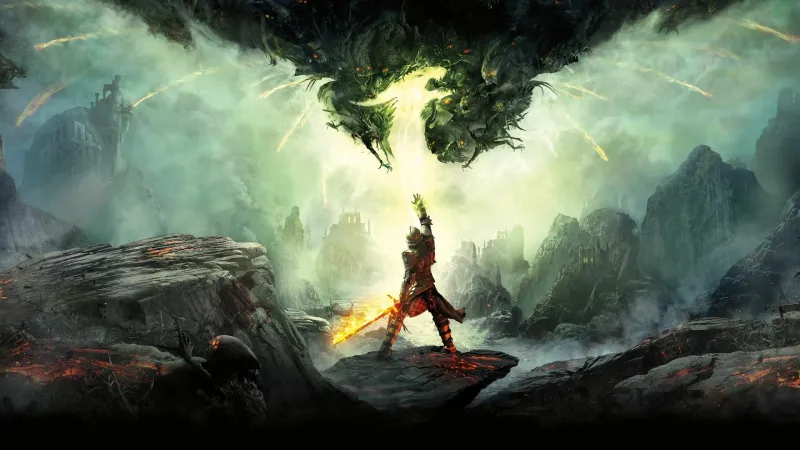
Dragon Age: The Veilguard launched last October, and though it fared decently amongst fans, publisher EA said it missed sales expectations by 50%, bringing in roughly 1.5 million players instead of the anticipated 3 million it had hoped. Those missed expectations have left fans wondering what the future of the series looks like while BioWare works on the next Mass Effect game.
Looking back on the franchise, however, we've recently learned BioWare, at one point, softly pitched a trilogy remaster of the first three Dragon Age games, but it was turned down by EA. That's according to Mark Darrah, former Dragon Age series producer and BioWare executive, in a new interview with MrMattyPlays on YouTube, as reported by IGN.
"I honestly think they should do – I don't think they will, but they should do – a remaster of the first three [Dragon Age games]," Darrah, who left BioWare in 2020 but consulted on last year's Dragon Age: The Veilguard, said to MrMattyPlays. "One of the things we pitched at one point – pretty softly, so pitched is a massive overstatement – was to retroactively rebrand the first games as if they were a trilogy, call it the Champions Trilogy, so you have these larger-than-life heroes... maybe you do that as a first step."
As for why this trilogy remaster, which would consist of Dragon Age: Origins (2009), Dragon Age II (2011), and Dragon Age: Inquisition (2014), never came to light, Darrah places the blame on EA.
"EA's historically been – and I don't know why, but they've even said this publicly – they're kind of against remasters," he told MrMattyPlays. "I don't really know why, and it's strange for a publicly traded company to seemingly be against free money, but they seem to be against it. So that's part of it."
Darrah later posits that a Dragon Age trilogy is a more challenging task than, say, a Mass Effect trilogy (which EA and BioWare did in the form of Mass Effect Legendary Edition in 2021), because of the series' storied development history and the engines used to create the games.
For more, read Game Informer's Dragon Age: The Veilguard review, and then check out Game Informer's Dragon Age: The Veilguard cover story hub for exclusive details and interviews about the game's development and more.
[Source: MrMattyPlays via IGN]
Do you want a Dragon Age trilogy remaster? Let us know in the comments below!
Battlefield 6 Beta Reaches Series Concurrent Peak, Overtakes Call Of Duty All-Time Peak
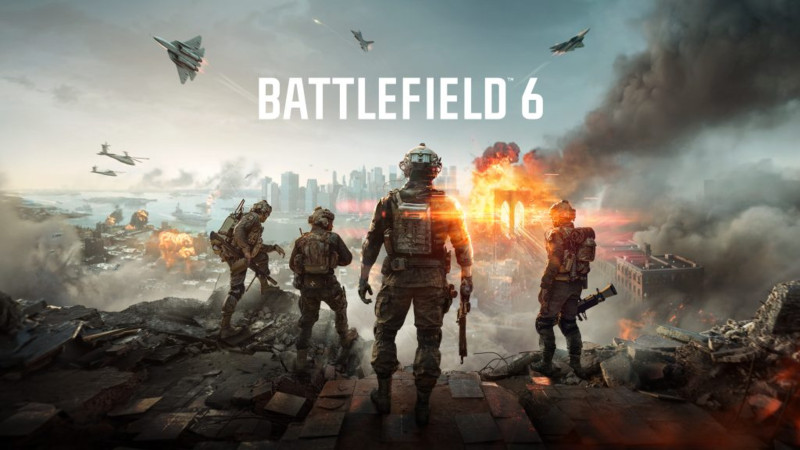
After the bug-riddled launch of Battlefield 2042 back in 2021, EA has been working to revitalize the Battlefield series’ name, placing Respawn’s Vince Zampella as its head amidst the creation of a wider Battlefield universe. If the recent Battlefield 6 beta over the weekend is any indication, those efforts are paying off. Not only did the beta surpass Call of Duty’s all-time player count, but it also reached a new concurrent peak for the Battlefield series.
EA calls the Battlefield 6 open beta its biggest ever, and Weekend 1 (Aug. 9-10) just wrapped up. Throughout the weekend, and on Aug. 7 and Aug. 8, when invite-only players could hop in early, I saw screenshots across social media showing queues stretching into the hundreds of thousands – a lot of people were playing this game.
Using SteamDB, a database that tracks Steam concurrent player counts, that checks out. On Saturday, the Battlefield 6 open beta peaked with 521,079 players, which is also an all-time peak for the entire Battlefield series. That number eclipses the peak of Call of Duty at 491,670, too, though it’s important to note these are just Steam numbers and console players could sway this observation in either direction.
Nonetheless, the point stands – Battlefield 6 is something players are excited about. The real test will be how many of these open beta (see: free) players will convert into paid players when Battlefield 6 launches on October 10 on PlayStation 5, Xbox Series X/S, and PC.
In the meantime, watch the Battlefield 6 debut trailer and then read our preview of Battlefield 6’s multiplayer after going hands-on with it.
Did you hop into the Battlefield 6 open beta this weekend? Let us know in the comments below!
Shadow Labyrinth Review - More Than You Can Chew
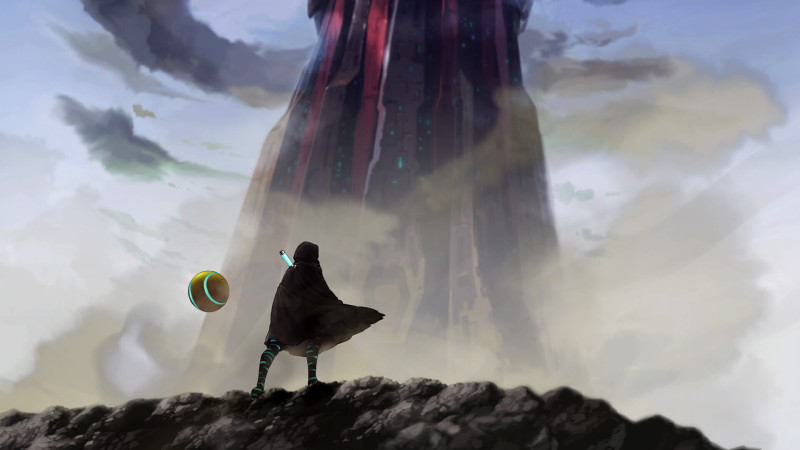
Reviewed on:
Switch 2
Platform:
PlayStation 5, Xbox Series X/S, Switch, PC
Publisher:
Bandai Namco
Developer:
Bandai Namco
Release:
Rating:
Teen
Why did they make a Pac-Man Metroidvania? It's an unavoidable question at the heart of Shadow Labyrinth, but one I ask with genuine curiosity. The game is Bandai Namco's attempt to transform Pac-Man, one of the most iconic video games of all time, into a more modern genre, but it's wrapped up in such a perplexing, peculiar wrapper that by the time I reached the end of the maze, I was just as confused as when I entered. Shadow Labyrinth is uneven, overstuffed, and often frustrating. It has decent moment-to-moment gameplay, but it fails to materialize into something coherent.
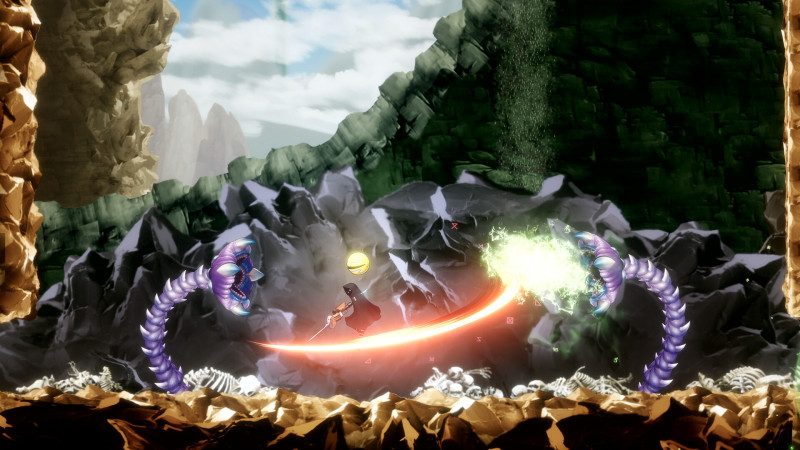
At no point in this game do you technically play as Pac-Man. It's the first confusing thing about Shadow Labyrinth, as the character's presence is the main selling point. For the majority of the experience, you play as a hooded, silent robot who wields a sword powered by ESP. Its stiff jump and attack animations remind me most of Hollow Knight, though that comparison doesn't do this game any favors. Like many Metroidvanias, the gameplay becomes more fun the deeper you get, thanks to new movement and combat abilities, and I was glad to leave the feeling of those early hours behind.
Your companion, who looks an awful lot like Pac-Man, is a female robot named Puck. She brings you to life to fight for her (she has no limbs and can't use weapons) for a mysterious purpose, which is only cleared up a few hours into the story. You play as Puck in specific instances, and I enjoy the classic gameplay of the Pac-Man series, but Puck is very different. You transform into her whenever touching walls made of blue light. She's essentially a magnet, jumping from platform to platform. She also automatically moves forward, so it's like every platform is a conveyor belt.
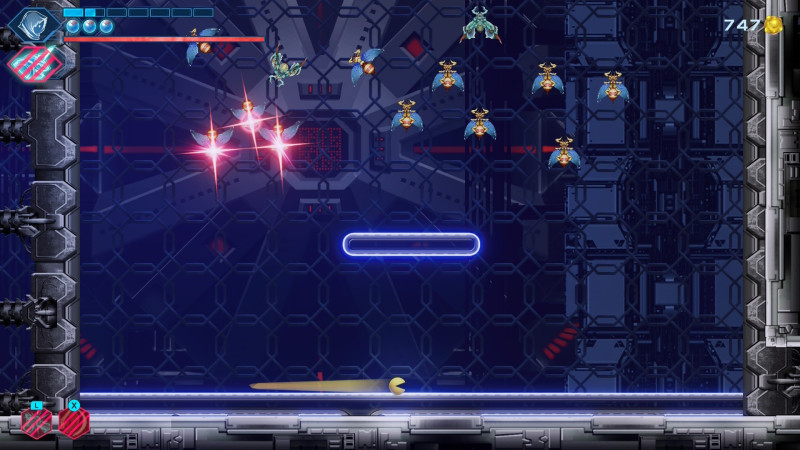 Puck avoids a group of diving enemies from the Galaga series.
Puck avoids a group of diving enemies from the Galaga series.
A red line to preview your jump trajectory and a brake button to keep you stationary are welcome additions, but I was never comfortable playing as Puck. Her combat sections are especially annoying because her only attack is to hurtle off the rail with a spinning blade. However, enemies hurt you if you touch them, and it's difficult to launch yourself at an enemy and make contact with your blade while avoiding your body. Luckily, you only play as Puck maybe 15 percent of the time, but that didn’t make me any more eager to do so.
There's also a third playable form; your G.A.I.A. meter transforms you into a hulking mech that can deal lots of damage and is immune to environmental hazards like spikes. It's a nice way to squeeze your way out of tough fights, and often serves as a satisfying, climactic closer for big battles.
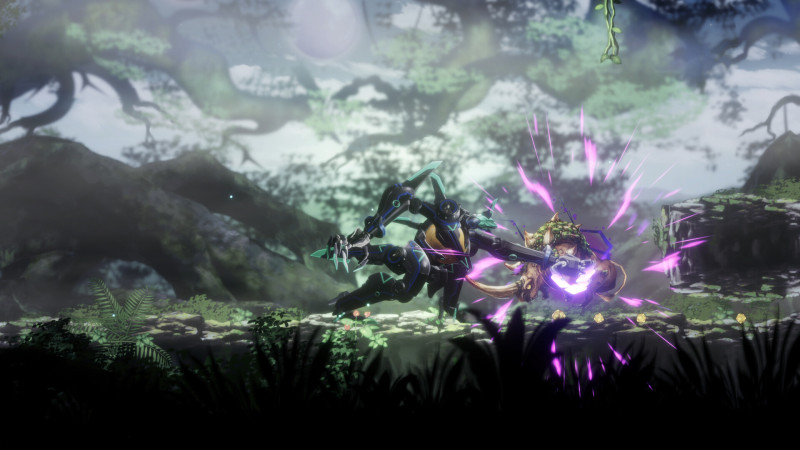 The G.A.I.A. form.
The G.A.I.A. form.
With these three gameplay styles combined, you set out on a sci-fi adventure to contribute to an intergalactic war. The accompanying story is, unfortunately, too complex for its own good, especially for how it's told. It's a plot with grand, wide-reaching ambitions, but information is told more often than it's shown, and the beats the player does experience are unoriginal and forgettable moments wrapped in the game's bizarre aesthetics.
Speaking of, the game's visuals leave a lot to be desired. Character models are tiny on the screen, but packed with so much indecipherable detail that they feel out of place, especially when compared to the sometimes-blurry backgrounds. The Bosconian village is a perfect example of this, as all its inhabitants are over-designed while the backdrop is grand and painterly. The lack of cohesion between these two elements never improves and is often distracting.
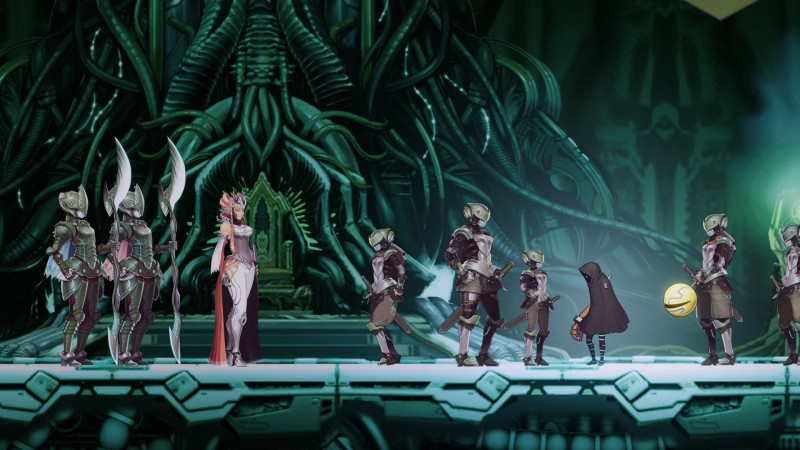 The Bosconian Village is a great example of how character models and the backgrounds look wildly different.
The Bosconian Village is a great example of how character models and the backgrounds look wildly different.
Shadow Labyrinth is most enjoyable in its moment-to-moment gameplay. It struggles with structural, game-wide design, but any given moment is usually okay, if not a little clunky. With one infuriating exception on the path to a crucial upgrade, platforming is engaging without being frustrating. And once you get a full suite of combat and movement abilities later in the game, combat is a somewhat enjoyable back-and-forth of attacking, parrying, and preserving your ESP meter, which you need for both dodging and special moves. That said, the combat, like much of the game, takes too long to get interesting.
Shadow Labyrinth is far too long – 30 to 40 hours – and it takes forever to unlock basic abilities. Parrying and blocking, two fundamental skills in most games, are unlocked through boss fights 5 to 7 hours into the game, way after you've become comfortable with the basics. On the other hand, it's easy to miss key abilities like the ground pound or double jump, and checkpoints are so few and far between that backtracking is a pain.
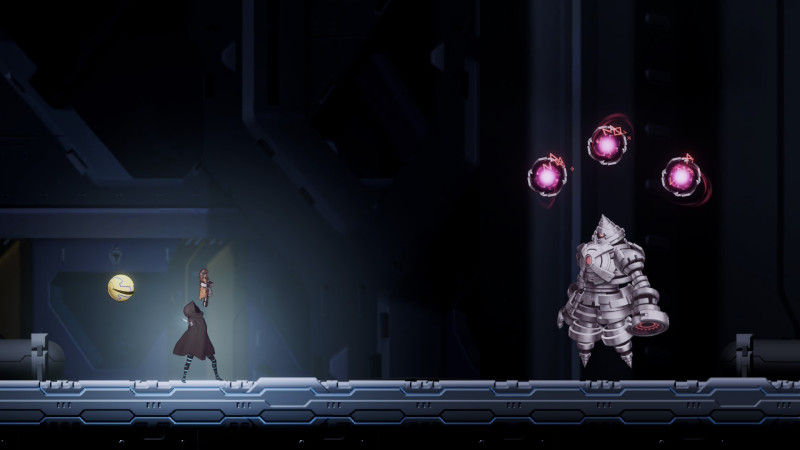
The whole experience ends on the most frustrating note of all – a massive difficulty spike, a barrage of boss fights, and an unending, multi-phase final showdown. It completely kills the momentum leading to the finale, making it disastrous for the story as well as the gameplay.
Shadow Labyrinth is such an odd concept that I optimistically assumed it came from a specific, focused creative pitch, but it's one of the least focused games I've ever experienced. The story, art design, and structure are messy and underbaked. It's middling at best and maddening at worst. It doesn't have enough Pac-Man for fans of that franchise, and its Metroidvania elements are too weak to appeal to fans of the genre, so why did they make a Pac-Man Metroidvania? After spending 40 hours with the game, I still don't know, and that makes it difficult to recommend.
Score: 5
Mafia: The Old Country And Gen Con Takeaways | The Game Informer Show

The Game Informer Show is a weekly podcast covering the video game industry. Join us every Thursday for chats about your favorite titles – past and present – alongside Game Informer staff and special guests from around the industry.
Subscribe to Game Informer Magazine: https://gameinformer.com/subscribe
Follow our hosts on social media:
- Charles Harte (@chuckduck365)
- Wesley LeBlanc (@wesleyleblanc)
- Eric Van Allen (@seamoosi)
Check out the video version here:
Listen to "Mafia: The Old Country And Gen Con Takeaways" on Spreaker. Jump to a specific discussion using these timestamps:00:00 - Introduction
04:18 - Mafia: The Old Country
35:05 - Gen Con 2025
1:10:26 - Ninja Gaiden: Ragebound
1:17:05 - Wheel World
Volume, John Wick Hex Studio Bithell Games Loses 'Majority' Of Staff To Layoffs
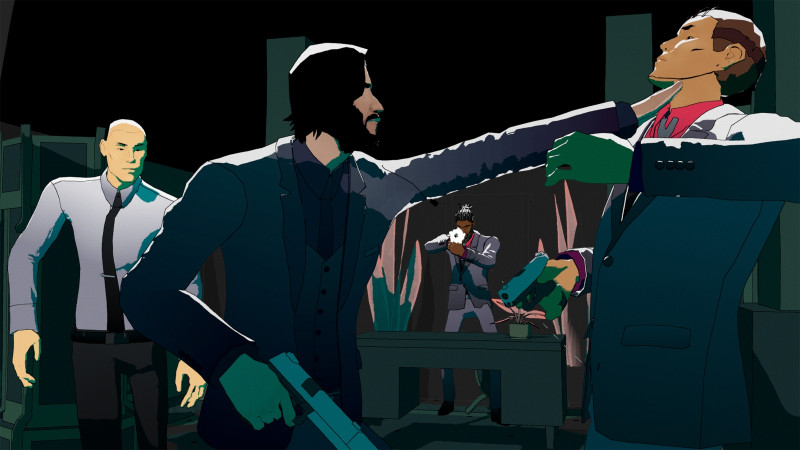
Bithell Games, the studio behind titles like Volume, John Wick Hex, and this year’s Tron: Catalyst, has been hit with layoffs. The resulting departures have dramatically reduced the studio’s size.
In a social post, studio head Mike Bithell explains his team was unable to secure funding for a large-scale project. “It has become clear leading up to the release of our most recent game that we were not immune to the challenges faced by many game development teams seeking funding partners in 2024 and 2025,” Bithell writes.
As a result, 11 employees have been let go, which Bithell says “constitutes the majority of our full-time staff.” He adds that the studio had preemptively prepared for this outcome and is working with affected employees to ease their departure and provide severance packages.
Bithell also says the layoffs will not affect the availability and support of its current released catalog of self-published titles. You can read his full statement below (click the image to enlarge).
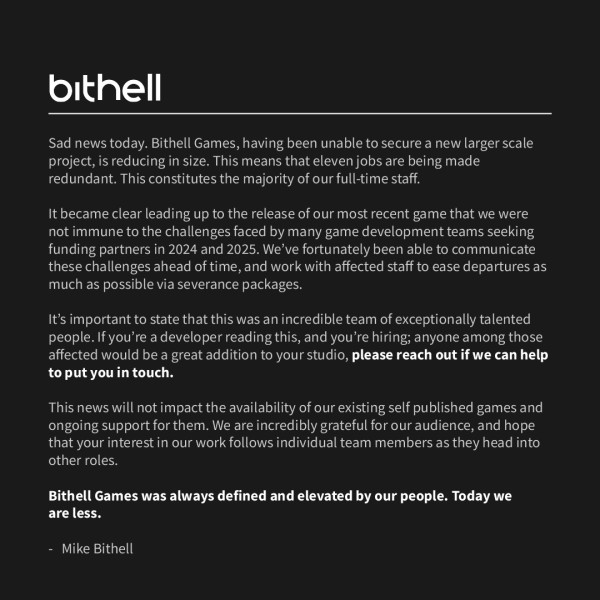
Mike Bithell came to prominence with Thomas Was Alone, a narrative-driven abstract puzzle-platformer. After forming Bithell Games, the studio gained a strong reputation for well-received releases such as the 2015 stealth game Volume and the acclaimed 2017 text-based adventure titles Subsurface Circular. The last few years have seen it delve into making inventive and stylish takes on licensed properties, such as the strategy title John Wick Hex (which was delisted last month), the visual novel puzzle title Tron: Identity, and 2025’s Tron: Catalyst, a top-down action game. Bithell Games has also published titles from its label developer Lunar Division: The Banished Vault and the upcoming Amberspire.